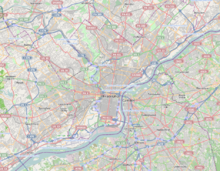Academy of Natural Sciences
 |
|
| Established | 1812 |
|---|---|
| Location | 1900 Benjamin Franklin Parkway Philadelphia, Pennsylvania, United States |
| Coordinates | 39°57′25″N 75°10′17″W / 39.9570°N 75.1714°W |
| Type | Natural history museum |
| Collection size | 17+ million specimens |
| Director | George W. Gephart Jr. |
| Website | www.ansp.org |
The Academy of Natural Sciences of Drexel University, formerly the Academy of Natural Sciences of Philadelphia, is the oldest natural science research institution and museum in the New World. It was founded in 1812, by many of the leading naturalists of the young American republic with an expressed mission of "the encouragement and cultivation of the sciences". For over two centuries of continuous operations, the Academy has sponsored expeditions, conducted original environmental and systematics research, and amassed natural history collections containing more than 17 million specimens. The Academy also has a long tradition of public exhibits and educational programs for both schools and the general public.
During the first decades of the United States, Philadelphia was the cultural capital and one of the country's commercial centers. Two of the city's institutions, the Library Company and the American Philosophical Society, were centers of enlightened thought and scientific inquiry.
The increasing sophistication of the earth and life sciences, combined with a growing awareness of the great variety of life and landscape in the American wilderness waiting to be discovered, led a small group of naturalists to establish the Academy of Natural Sciences in the winter of 1812. The academy was meant to foster a gathering of fellow naturalists, and nurture the growth and credibility of American science. They frequently looked to their European counterparts for inspiration and expertise and longed to be regarded as equals.
On 25 April 1817 they were incorporated into the society under the title of the Academy of Natural Sciences of Philadelphia by the legislature of Pennsylvania. By 1 January 1818, eight members were published.
Within a decade of its founding, the Academy became the undisputed center of natural sciences in the United States. Academy members were frequently enlisted to participate in national surveys of the western territories and other major expeditions. Several of its earliest members, including William Bartram, John Godman, Richard Harlan, Charles Alexandre Lesueur, William Maclure, Titian Peale, Charles Pickering, Thomas Say, and Alexander Wilson were among the pioneers or recognized authorities in their respective areas of study. Thomas Jefferson of Virginia, John Edwards Holbrook of South Carolina, Thomas Nuttall and Richard Owen of the United Kingdom, Georges Cuvier of France, and Alexander von Humboldt of Prussia were among the corresponding members (members who lived far from Philadelphia) of the Academy's first decades.
...
Wikipedia

